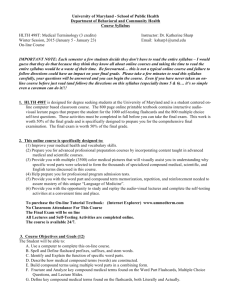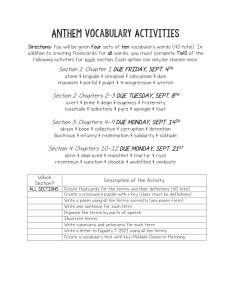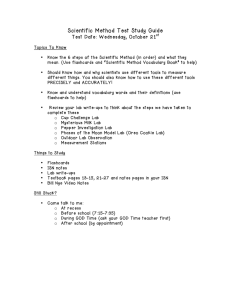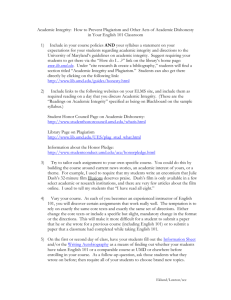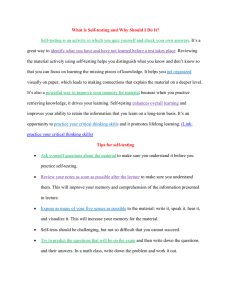Syllabus - Office of Extended Studies
advertisement
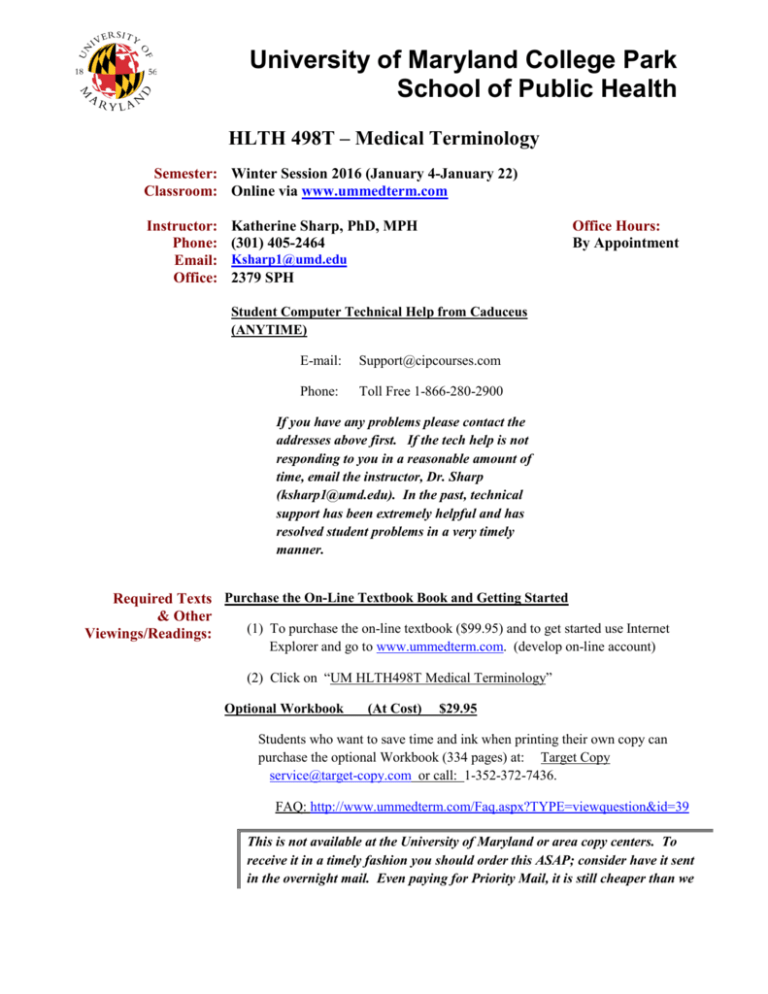
University of Maryland College Park School of Public Health HLTH 498T – Medical Terminology Semester: Winter Session 2016 (January 4-January 22) Classroom: Online via www.ummedterm.com Instructor: Phone: Email: Office: Katherine Sharp, PhD, MPH (301) 405-2464 Office Hours: By Appointment Ksharp1@umd.edu 2379 SPH Student Computer Technical Help from Caduceus (ANYTIME) E-mail: Support@cipcourses.com Phone: Toll Free 1-866-280-2900 If you have any problems please contact the addresses above first. If the tech help is not responding to you in a reasonable amount of time, email the instructor, Dr. Sharp (ksharp1@umd.edu). In the past, technical support has been extremely helpful and has resolved student problems in a very timely manner. Required Texts Purchase the On-Line Textbook Book and Getting Started & Other (1) To purchase the on-line textbook ($99.95) and to get started use Internet Viewings/Readings: Explorer and go to www.ummedterm.com. (develop on-line account) (2) Click on “UM HLTH498T Medical Terminology” Optional Workbook (At Cost) $29.95 Students who want to save time and ink when printing their own copy can purchase the optional Workbook (334 pages) at: Target Copy service@target-copy.com or call: 1-352-372-7436. FAQ: http://www.ummedterm.com/Faq.aspx?TYPE=viewquestion&id=39 This is not available at the University of Maryland or area copy centers. To receive it in a timely fashion you should order this ASAP; consider have it sent in the overnight mail. Even paying for Priority Mail, it is still cheaper than we could have it re-produced at a local copy center. Students are strongly encouraged to call or email the Target Copy ASAP. The Optional Workbook contains the following: 1. Section 1: Lecture table of contents 2. Section 2: Key 200 pages of the 800 page online textbook. 3. Section 3: 1000 flashcards with word part, abbreviation, and compound term meanings. 4. Section 4: 800 multiple choice questions and answers. Course Description This one semester course provides the framework for understanding medical language and terminology used by health care professionals. Students will gain an understanding of the rules of building and analyzing medical terms from word origins and will learn correct pronunciation, definitions, and spelling for all of the body systems, major pathological conditions, common disorders, prescribed medications, and more. Whether a student is interested in learning more about the medical field or they want to acquire practical knowledge for future personal use, this course provides the foundation for understanding the language of medicine. Major course topics include the pronunciation, defining, and spelling of medical terminology, word roots, prefixes, suffixes, and connecting/combining forms, as well as interpreting common abbreviations, relating medical terms to structure and function, and recognizing major conditions, diseases and disorders of the human body. This course is designed for degree seeking students at the University of Maryland and is a student centered on-line computer based classroom course. The 800 page online printable textbook contains interactive audio-visual lecture pages that prepare the student for the 1000 self-testing flashcards and the 800 multiple choice self-test questions. These activities must be completed in full before you can take the final exam. This work is worth 50% of the final grade and is specifically designed to prepare you for the comprehensive final examination. The final exam is worth 50% of the final grade. Course Learning Objectives This online course is specifically designed to: (1) Improve your medical health and vocabulary skills. (2) Prepare you for advanced professional preparation courses by incorporating content taught in advanced medical and scientific courses. (3) Provide you with multiple (3500) color medical pictures that will visually assist you in understanding why specific word parts were selected to form the 2 thousands of specialized compound medical, scientific, and English terms discussed in this course. (4) Help prepare you for professional program admission tests. (5) Provide you with the word part and compound term memorization, repetition, and reinforcement needed to assure mastery of this unique “Language of Medicine”. (6) Provide you with the opportunity to study and replay the audio-visual lectures and complete the self-testing activities at a convenient time and place. Course Objectives and Goals The student will be able to: A. Use a computer to complete this on-line course. B. Spell and Define flashcard prefixes, suffixes, and stem words. C. Identify and Explain the function of specific word parts. D. Describe how medical compound terms (words) are constructed. E. Build compound terms using multiple word parts in a combining form. F. Fracture and Analyze key compound medical terms found on the Word Part Flashcards, Multiple Choice Questions, and Lecture Slides. G. Define key compound medical terms found on the flashcards, both Literally and Actually. H. Spell and Define medical equipment, treatment, disease, and diagnostic compound terms. I. Identify Visually and Describe Verbally some of the medical problems, disorders, and diseases presented in the lectures. J. Perform at a high level on Professional Program Admission Examinations. K. Interpret and Understand medical course content, literature, records, and research. L. Interpret and Understand word (term) meanings from a wide variety of academic disciplines in the Arts, Sciences, Humanities, Education, Agriculture, and Technology. Course Requirements 3 Each semester several students decide they don’t have to read the entire syllabus – I would guess that they do that because they think they know all about online courses and taking the time to read the entire syllabus would be a waste of their time. Be forewarned… this is not a typical online course and failure to follow directions could have an impact on your final grade. Please take a few minutes to read this syllabus carefully, your questions will be answered and you can begin the course. Even if you have never taken an on-line course before just read (and follow) the directions on this syllabus. Course Policies Email – The Official University Correspondence: Verify your email address by going to www.my.umd.edu. All enrolled students are provided access to the University’s email system and an email account. All official University email communication will be sent to this email address (or an alternate address if provided by the student). Email has been adopted as the primary means for sending official communications to students, so email must be checked on a regular basis. Academic advisors, faculty, and campus administrative offices use email to communicate important and time-sensitive notices. Students are responsible for keeping their email address up to date or for redirecting or forwarding email to another address. Failure to check email, errors in forwarding email, and returned email (from “full mailbox” or “unknown user” errors for example), will not excuse a student from missing University announcement, messages, deadlines, etc. Email addresses can be quickly and easily updated at www.my.umd.edu or in-person at the Student Service Counter on the first floor of the Mitchell Building. For technical support for University email: www.helpdesk.umd.edu or call 301-405-1400. Absence Policy: Due to the online nature of the class, attendance is not required; however, if a major illness arises that limits or prohibits your ability to complete assignments, you MUST submit written documentation to me immediately that discloses the reason and is signed by a health care provider/organization. In most instances, I will recommend that you withdraw from the course. SEE MISSED EXAM POLICY BELOW Missed Exams: If you are unable to take the exams during the specified time intervals, you must contact me at least 24 hours BEFOREHAND, not after. Make-up exams will be considered only for those students who have a legitimate reason for absence and provide written documentation to substantiate their absence. In such an event, the professor must be contacted on the exam day. Otherwise, no accommodations will be made for taking a make-up exam. Late Assignments: Late assignments are not accepted. 4 Under NO circumstances will there be extra credit opportunities in this class! Religious Observances: The University System of Maryland policy provides that students should not be penalized because of observances of their religious beliefs; students shall be given an opportunity, whenever feasible, to make up within a reasonable time any academic assignment that is missed due to individual participation in religious observances. It is the student’s responsibility to inform the instructor in advance of any intended inability to complete assignments due to a religious observance. Given the diversity of religious observances within our student body, students who foresee a conflict with a particular assignment due date or examination due to a religious observance, should notify the instructor within the first two weeks of the semester to make appropriate accommodations. Special Accommodations / Disability Support Services: If you have a documented disability and wish to discuss academic accommodations for test taking or other needs, you will need documentation from Disability Support Service (301-314-7682). If you are ill or encountering personal difficulties, please let the instructor know as soon as possible. You can also contact Learning Assistance Services (301-314-7693) and/or the Counseling Center (301-314-7651) for assistance. If you intend to take any or all exams at DSS it is your responsibility to notify the instructor within the first two weeks of the semester. Academic Integrity: The University's code of academic integrity is designed to ensure that the principle of academic honesty is upheld. Any of the following acts, when committed by a student, constitutes academic dishonesty: • • • • CHEATING: intentionally using or attempting to use unauthorized materials, information, or study aids in an academic exercise. FABRICATION: intentional and unauthorized falsification or invention of any information or citation in an academic exercise. FACILITATING ACADEMIC DISHONESTY: intentionally or knowingly helping or attempting to help another to violate any provision of this code. PLAGIARISM: intentionally or knowingly representing the words or ideas of another as one's own in any academic exercise. For more information see: http://www.testudo.umd.edu/soc/dishonesty.html The Honor Pledge is a statement undergraduate and graduate students should be asked to write by hand and sign on examinations, papers, or other academic assignments. The Pledge reads: 5 I pledge on my honor that I have not given or received any unauthorized assistance on this assignment/examination. The University of Maryland, College Park has a nationally recognized Code of Academic Integrity, administered by the Student Honor Council. This Code sets standards for academic integrity at Maryland for all undergraduate and graduate students. As a student you are responsible for upholding these standards for this course. It is very important for you to be aware of the consequences of cheating, fabrication, facilitation, and plagiarism. For more information on the Code of Academic Integrity or the Student Honor Council, please visit http://www.shc.umd.edu. Statement on Cheating The Department of Behavioral and Community Health has a zero tolerance policy on academic dishonesty of any kind. If a Departmental instructor believes that a student has been involved in academically dishonest activity, he or she will report it to the University’s Office of Student Conduct, and is not obligated to disclose the report to the student in question. Once referred, the Office of Student Conduct will contact the student in writing to inform them of the charges. Inclement Weather / University Closings: In the event that the University is closed for an emergency or extended period of time, the instructor will communicate to students regarding schedule adjustments, including rescheduling of examinations and assignments due to inclement weather and campus emergencies. Official closures and delays are announced on the campus website (http://www.umd.edu) and snow phone line (301-405-SNOW), as well as local radio and TV stations. Available Support Services Course Evaluations: The University, the School of Public Health, and the Department of Behavioral and Community Health are committed to the use of student course evaluations for improving the student experience, course and curriculum delivery, and faculty instruction. Your evaluations help instructors improve their courses; help deans and department chairs decide on merit pay for faculty, renewal of contracts, and support tenure and promotion decisions; and help current and future students decide on classes. If you are experiencing difficulties in keeping up with the academic demands of this course, contact the Learning Assistance Service, 2201 Shoemaker Bldg, 301 (314-7693). Their educational counselors can help with time management, reading, note-taking and exam preparation skills. If you need research assistance from a librarian, please contact Nedelina Tchangalova, the SPH Librarian, at: (nedelina@umd.edu); 301.405.9151 6 Grading Procedures: Online Computer Self-Testing Questions 1000+800………. 50% of Final Grade. Graded on completion only, not accuracy!! Final Examination (Online)…………………….………. completion AND accuracy. Grading Scale: 50% of Final Grade. Graded on A+ = 100% - 97% A = 96% - 93% A- = 92% - 90% B+ = 89% - 87% B = 86% - 83% B- = 82% - 80% C+ = 79% - 77% C = 76% - 73% C- = 72% - 70% D+ = 69% - 67% D = 66% - 63% D- = 62% - 60% F = Below 60% Course Outline / Course Calendar: Course Flow Plan A. View and listen to the Audio-Visual Lectures in Chapters 1 through 4. B. Complete the Multiple Choice Question Bank (10 Item Quizzes) in Chapter 4. C. Memorize and complete the self-testing for the 1000 Flashcards in Chapter 5. D. View and listen to the Audio-Visual Lectures for the Body Systems in Chapters 6-14. Complete the 800 Diseases and Disorders Multiple Choice Question Banks (10 Questions/Self-Test) in the last file of Chapters 6-14. E. Finally, generate a printed Summary Sheet by clicking the typewriter symbol at the left of your computer screen. This sheet will show the number of lecture pages that you have completed in the online textbook, the self-testing totals for the 1000 flashcards in Chapter 5, and the totals for the 800 multiple choice questions in Chapters 4 and 6-14. F. Chapter 16 is your final exam… you can begin the final exam any time after you have completed the course. Please note: if you skip any chapters/chapters tests, the computer system will NOT allow you to proceed to the final exam. You must complete A-D above PRIOR to starting the final exam. Make sure you read the directions very carefully since you’ll have 120 minutes to complete 300 questions (T/F and Multiple Choice). Once you start the final exam you have 120 minutes to complete it. The computer system will not kick you out of the exam after 120 minutes, so YOU are responsible for watching the clock. The instructor has access to the time and day you start and finish the exam. If you exceed the time allotted, you will NOT receive partial credit – you will receive a ZERO on the final exam. 7 Suggested Course Flow Plan for Lectures and Self-Testing Interactive Work: If anyone has any questions regarding the syllabus contact Dr. Sharp immediately. If anyone has any problems or questions about the course, contact the Technical Support. The timeline below is only a suggested plan. Students interested in working at a faster pace can do so. Future chapters become available as each chapter is completed. Date Suggested To Do List: Week 1: Jan 4-9 Overview of Syllabus, Online E-Textbook, and Self-Testing Items Study Lecture Chapters 1 through 4: The Basics of Medical Terminology Chapter 4 Test Bank contains a File of 114 Multiple Choice Self-Test Questions Chapter 5: Memorize and Complete the 1000 Self-Testing Flashcards Complete approximately 250 Flashcards Per Day for 4 Days = 1000 Flashcards [Weeks 2-6 Body System Lecture Chapters & the Self-Test Multiple Choice Questions] Chapter 6: Musculo/Skeletal System Week 2 Jan 10-16 Chapter 7: Nervous System and Special Senses Chapter 8: Cardio/Vascular System Chapter 9: Respiratory System Chapter 10: Integumentary System Chapter 11:Digestive System Week 3: Jan 17-22 Chapter 12: Uro/Genital System Chapter 13: Venereal Disease Chapter 14: Endocrine System Chapter 15: Appendix Chapter 16: FINAL EXAM Due by 2:00 pm on Jan 22nd. 8 FINAL EXAM (1) Please read all directions carefully. No exceptions!!! (2) The final examination will be 300 questions (multiple choice and true-false) developed from the 1000 Flashcard Word Part and Medical Abbreviation Meanings and the 800 Multiple Choice Questions. (3) Make sure you have completed all of the chapters in the course before starting the final exam. (4) Once you begin the final exam you’ll have 120 minutes to complete it. Once you begin the final exam you’ll have 120 minutes to complete it. If you do not complete the exam by 2pm on January 22nd you will FAIL to the course. There is no partial credit for what you have completed at 2pm. The computer program will not throw you out of the exam at 2:00pm so it is imperative that YOU are watching the clock. (5) You can take the exam any time after you’ve completed the 14 chapters and up to the deadline time and date. (6) The final exam must be completed by Friday, January 22nd at 2:00pm. Why 2pm? Because you are more likely to receive support from Technical Support should something go wrong in the early afternoon rather than at the end of the business day (e.g., 5:00pm) or at midnight when no one is immediately available. It has been my experience that some (many?) students are notorious for waiting until the very last minute to complete their work. I strongly encourage everyone to begin the exam no later than 9:00am on the 21st. Then, if something goes wrong there will be enough time to get technical support from Caduceus (1-866280-2900) and complete the exam on time. Anyone who does not have the entire course and exam completed by 2:00pm on January 22nd will fail the course. Anyone who has any concerns with this timeline needs to contact me (ksharp1@umd.edu) before Wednesday, January 6th, 2016. If you have questions or concerns about the syllabus or the course please contact me within the next 2 or 3 days. 9

